The history of Côte d’Ivoire and that of France have been linked for centuries, starting with the country’s history and politics.
Became a French colony in 1893, Côte d’Ivoire was included in the West African Federation of AOF (French West Africa), between 1906 and 1958. After years of repression and tension with the opposition and thousands of independence activists arrested, the 1956 overseas reform framework law decided to transfer powers from Paris to local authorities, without however slowing down the movement towards independence.
In December 1958, Côte d’Ivoire became an autonomous republic through a referendum, creating the French Community between France and its former colonies. After being led by a prime minister, Auguste Denise, a new man came to power in April 1959, Félix Houphouët-Boigny.
Founding president for life relying on his single party, the Democratic Party of Côte d’Ivoire (PDCI), he was also one of the founders of the African Democratic Rally (RDA), a pre-independence political party for the entire French West Africa except Mauritania.
In 1944, he began his career by founding the African Agricultural Union, the nucleus of the PDCI. Elected by a narrow majority at the first constituent assembly after World War II, he represented Côte d’Ivoire in the National Assembly from 1946 (when he proposed a law abolishing forced labor) to 1959 when he was first minister before being elected president in 1960 He was then re-elected every 5 years from 1965 until December 1993, the year of his death; its single party, the PDCI-RDA, occupies all the seats in the National Assembly. In addition, French citizenship is granted to African subjects and the right to organize politically recognized at the same time). He was Minister of the Republic for 3 years, mainly devoted to inter-territorial political organizations within the AOF, and to improving working conditions.
He is also the creator of the Council of the Entente (economic development organization) with Niger, Upper Volta (Burkina Faso), Togo, and Dahomey (Benin) in 1959, asserting that the only way for solidarity Africa is progressive economic development and political cooperation and recognizing the principle of non-intervention in the internal affairs of African states.
On October 4, 1958, Houphouët-Boigny was one of the signatories, alongside De Gaulle, of the constitution of the Fifth Republic. Several times Minister of State in different governments between 1956 and 1961, his last post was that of Minister Counselor to the Michel Debré government from July 23, 1959 to May 19, 1961.
Although it became independent in August 1960, the country remains linked to France through its currency led by the Banque de France, through the West African monetary union (CFA franc) and numerous French investments making the economy Ivorian dependent on France; autonomy allows Côte d’Ivoire to no longer share its wealth with the other poor colonies of the Sahel, increasing the budget of the Ivorian administration by 152%.
On April 21, 1961, a military assistance agreement was signed with France as well as with Dahomey and Mali. In 1964, polygamy was abolished. The 1980s were subject to student unrest, a revolt by the regime’s barons and the birth of an underground opposition as well as the revelation of a leader, Laurent Gbagbo, founder of the Front populaire ivoirien (FPI), and exiled in France.
In 1989, he created a prize for the search for peace sponsored by Unesco to resolve any conflict inside and outside States, it is awarded each year by an international Jury, made up of 11 personalities from five continents, and awards a check for 122,000 euros.
Several reforms mark the end of his reign, while preparing his succession towards the path of democratization in 1990:
- 14 political parties are formed and authorized on May 5.
- For the first time, 2 candidates are running for the presidential election: Laurent Gbagbo who obtains 18% of the vote against the outgoing president. Laurent Gbagbo will be arrested along with his wife in 1992 and will remain imprisoned for several months.
- Pluralist elections, where foreigners whose Burkinabés are voters, take place: the PDCI-RDA wins 175 seats, against 8 for the FPI.
After Houphouët-Boigny’s death, Henri Konan Bédié served as interim president of the National Assembly and was elected on October 22, 1995, losing power in a coup in Noel 1999. Protesters put Laurent Gbagbo in power following the 2000 elections in which Alasaane Ouattara’s RDR. candidacy was ruled out for questioning his nationality, as well as that of Bédié for not consulting the medical college appointed by the Constitutional Council, but General Robert Guéï refused the results and was assassinated in the failed coup of the Patriotic Movement of Côte d’Ivoire (MPCI) in 2002. On September 19, the civil war broke out, resulting in a political crisis in the 2010 presidential election, despite the signing of the Ouagadougou political agreement on March 4, 2007, which was subsequently called into question.
Alassane Dramane Ouattara (ADO) won the elections ahead of Laurent Gbabo, according to the Independent Electoral Commission (CIS), UNOCI and a large part of the international community. On May 21, 2011, he took over as President of the Republic after violent clashes in Abidjan and the provinces. However, Laurent Gbabo was declared victorious by the Constitutional Council, and refused to leave power, he was finally arrested and imprisoned at the International Criminal Court in The Hague, he was acquitted at first instance in January 2019 pending a possible second trial, he lives in Belgium.
In October 2015, ADO was re-elected in the first round. Following the military uprising in 2017, the mutineers are forcing the government to pay promised bonuses, but former allied troops have not received any rewards and continue to mutiny.
After finishing his second term, ADO declared in March 2020 that he would not want to run for a third term and give way to the new generation. The death of former Prime Minister Amadou Gon Coulibaly makes him change his mind. On August 6, he announced his candidacy for the October 30, 2020, election.
For his part, after a failed return to his country, Guillaume Soro, former leader of the rebellion and presidential candidate in 2020, confirmed his candidacy with the Ivorian president, from France, an international mandate was issued against him.
The number of presidential terms is limited to 2 by the Ivorian Constitution but Opposition and Power disagree on the interpretation of the reform adopted in 2016: Ouattara’s supporters claim that the term count has been reset to zero, a 3rd candidacy is deemed unconstitutional by opponents.
Following the decision, many protests were organized by opponents armed with machetes, clubs and rifles, destabilizing the country and turning into a conflict between communities (Baoulé and Malinké) in the center of the country. In Daoukro, 1 man was shot to death.There are 5 other opponents who have died and 116 injured since Wednesday, August 12. You can see the presence of barricades, fire trucks and shops, broken bottles, projectiles… The seats of President Ouattara’s PDCI (Democratic Party of Côte d’Ivoire) and RHDP (Rally of Houphouëtistes for Democracy and Peace) were ransacked during 3 days of violence. The police moved into a « buffer zone » between the two sectors.
Several Ivorian cities rose on August 07, the day of the country’s independence. So far, the clashes continue.
In Paris, the Ivorian diaspora of all tendencies met on Saturday, August 8 and 15 on the Parvis des droits de l’homme, at the place du Trocadéro to demand respect for the Constitution and say no to a third unconstitutional term of the President.
Among the demonstrators, several leaders of the opposition parties were present such as Abel Naki (Pan-African Cree and CDRP), Dr. Boga Sako (Fidhop-Graddh Africa and EDS), Me Affousi Bamba (GPS and CDRP), Pascal Logbo (NPR and EDS), Christian Vabé (RPCI-AC and EDS). All opposition political parties were represented, including the Gbagbo FPI, the Bédié PDCI-RDA, the GPS of Guillaume Soro, the Goudé COJEP, the Gbagboist EDS and CDRP platforms, as well as all the patriotic movements of France.
On August 13, a rally was held from 2 p.m. to 8 p.m. in front of the Ivory Coast embassy in Paris in support of protests in the country. On the 15th, a large march took place from Trocadéro to the embassy.
Views: 1


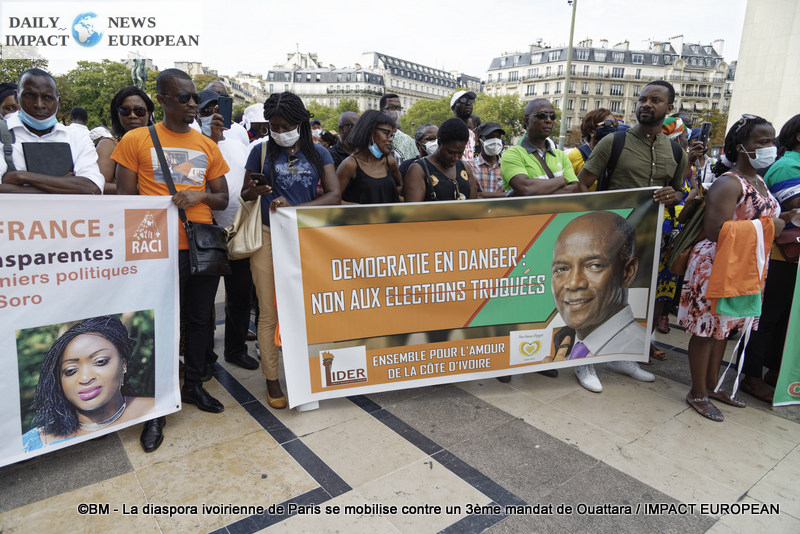
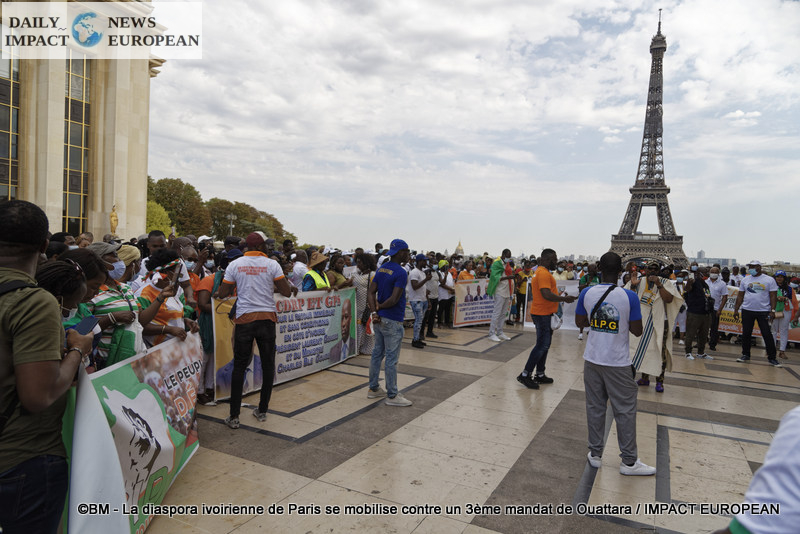
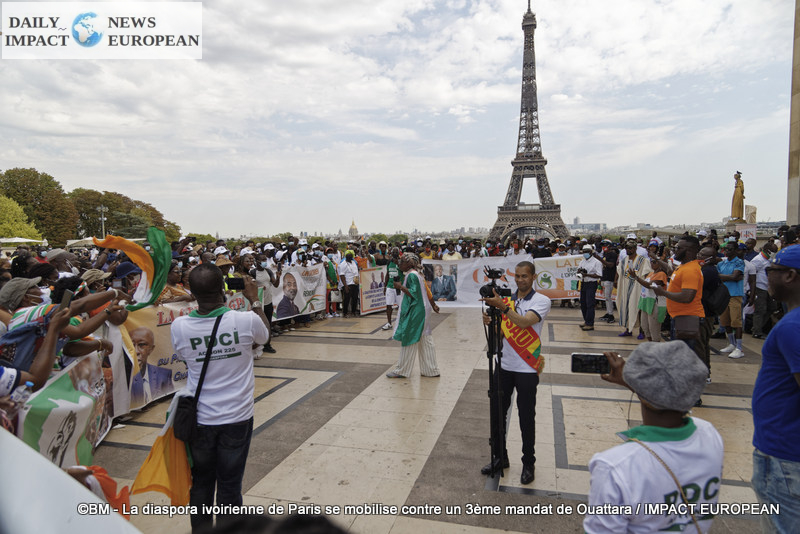
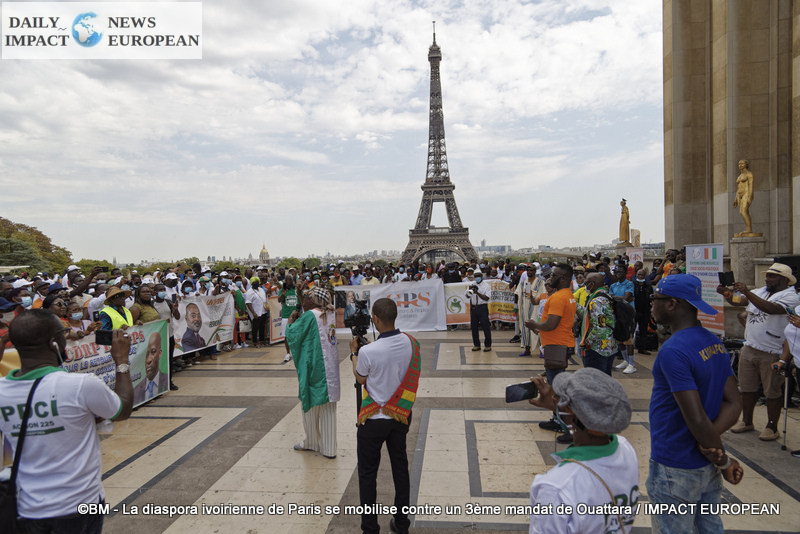
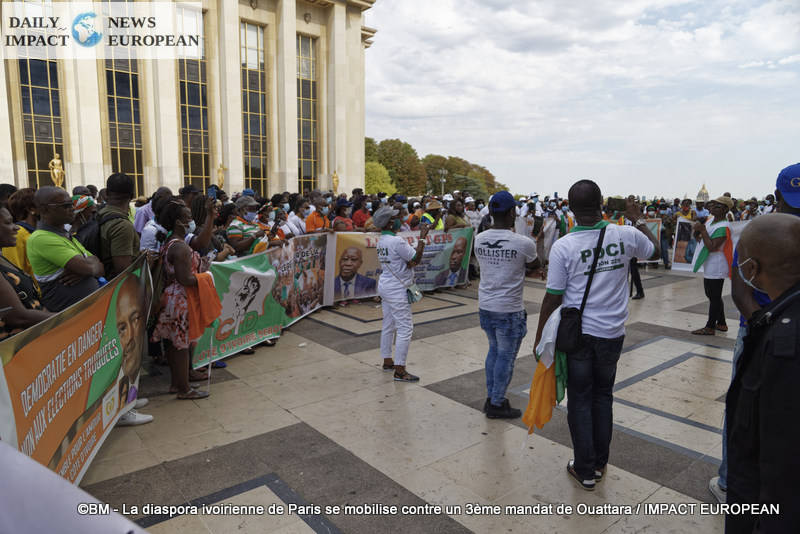
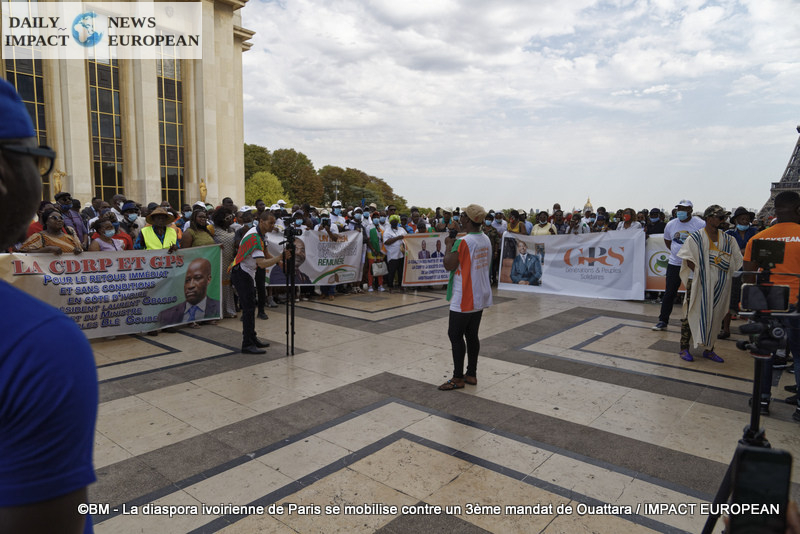
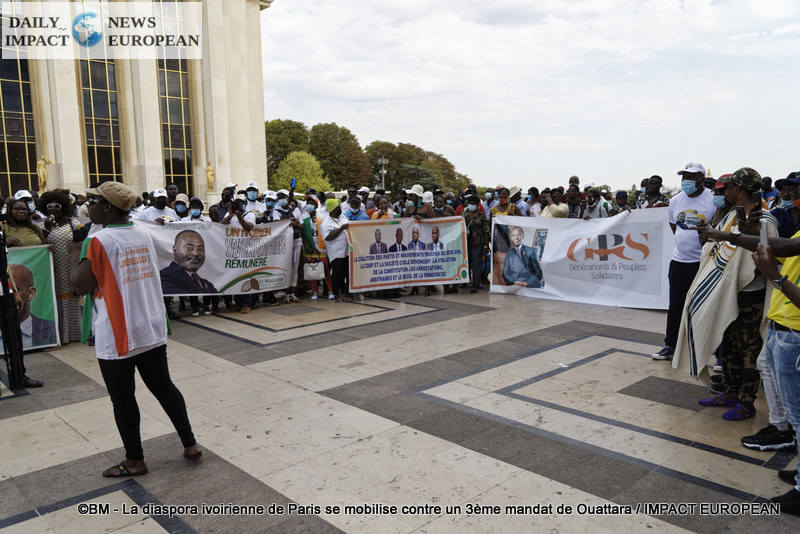
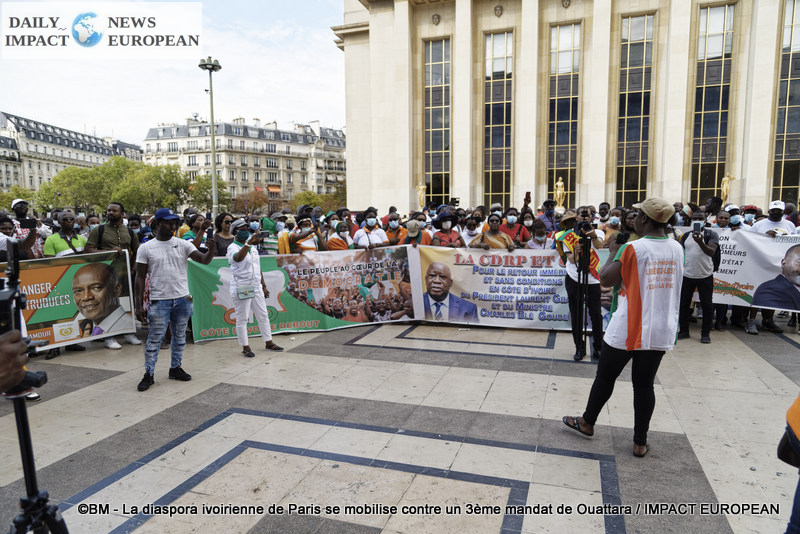
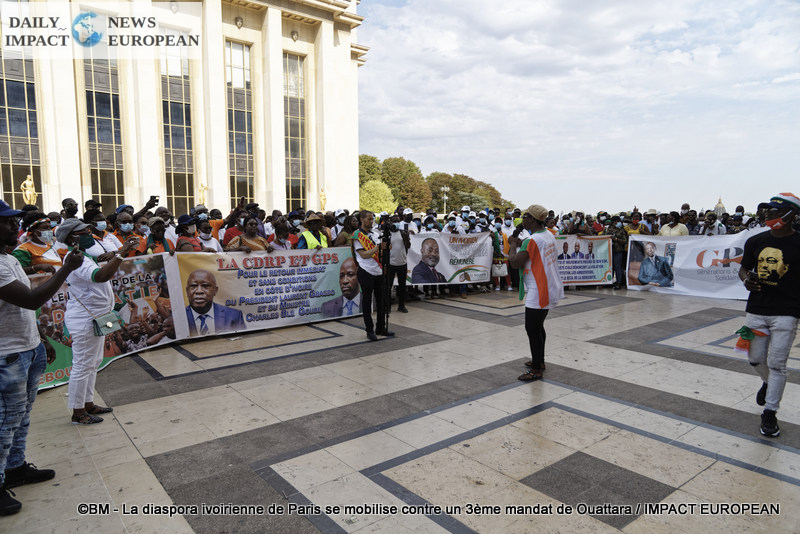
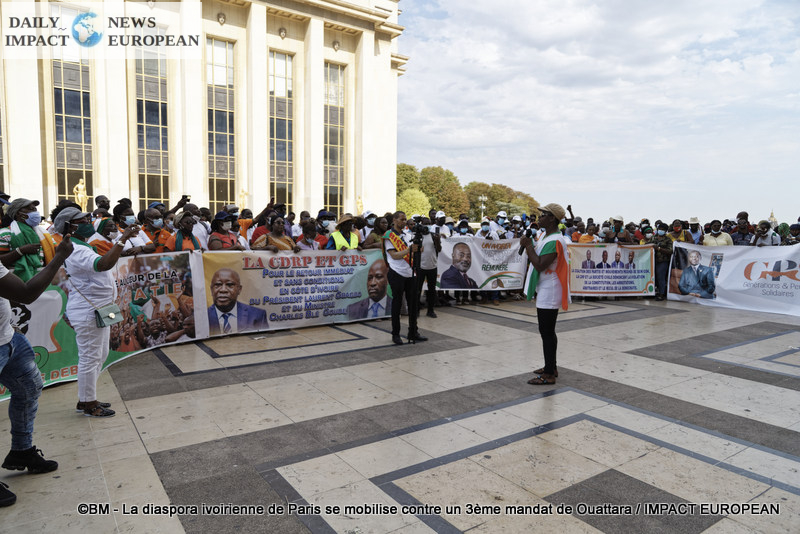
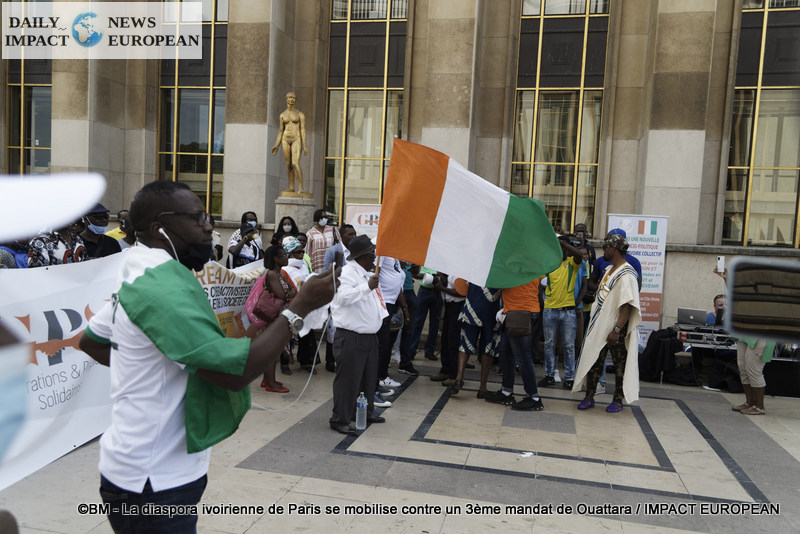
More Stories
Georges Fenech, a Symbol of Renewed Youth, Finds Love Again and Gets Married
United Arab Emirates and Artificial Intelligence: Global Leadership and Strategic Partnerships with France
Premiere of « Gourou » at Pathé